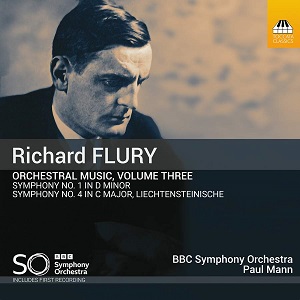
Richard Flury (1896-1967)
Orchestral Music Volume Three
Symphony No 1 in D minor (1924)
Symphony No 4 in C major ‘Liechtensteinische’ (1950-1951)
BBC Symphony Orchestra/Paul Mann
rec. 2022, Studio MV1, BBC Maida Vale Studios, London
Toccata Classics TOCC0643 [77]
Remember that smug British parlour game “name six famous Belgians”? Musical folk could try to name six significant Swiss composers. You might manage Frank Martin and Arthur Honegger, but then who? Maybe the prolific symphonist Fritz Brun (1878-1959) or composer, painter and journalist Peter Mieg (1906-1990). Well, you can now add Richard Flury. I have paid his music little attention till now. Toccata Press published a book Chris Walton entitled The life and music of a Swiss Romantic. Urs Joseph Flury has founded a society to promoting his father’s works. Toccata Classics have brought out six discs, including two operas. Recordings by other companies have emerged over the last twenty or more years.
Symphony No 1 is in the key of D minor, which significantly relates to three great symphonies known to Flury and to his original audiences: Beethoven’s 9th, Dvorak’s 7th and Bruckner’s 3rd. The last might be the biggest influence. The opening string ostinato and an oboe solo soon to appear above it suggest one has heard something like it before. Yet you realise that it and the music which follows are different. Romantic surely, Brucknerian at times, even Rachmaninov might come to mind, but here is a mostly personal voice. There is also an element of the cyclic form: the opening theme, clearly present a minute into the first movement, is also heard, at least in part, in the other three, and certainly in the finale. The dreamy Andante con moto offers an impression of landscape and open spaces, even Brucknerian mountains. The Scherzo and trio, as conductor and booklet write Paul Mann readily admits, are a cross between a waltz and a landler, so they show the composer’s love of the Viennese classics. The finale is a jaunty Allegro, contrasting with the more dramatic and powerful ideas of the first movement. As Flury’s teacher Joseph Marx said, this symphony was a very fine start to a career. Its reception was highly favourable; there were several performances in the following years.
Symphony No 4, thirty years on, is still Romantic. After a brief hesitant start, a fully blown sweeping romantic melody takes over, of the kind Tchaikovsky or possibly Richard Strauss might have revelled in. The name ‘Leichtensteinische’ is curious. First, the work is in memory of the Liechtensteiner organist and prolific composer Josef von Rheinberger. Next, it is dedicated to Franz Josef II of Liechtenstein, who it appears had never met Flury and was not especially interested in the symphony.
Maybe in homage to Rheinberger, this is a classical four-movement work. Movement 1 is in sonata form with, imaginatively, not a literal repetition of the subjects in the recapitulation. In the following Andante, as one critic wrote, the “music follows the moods of nature”. It seems to be evoked in this elegant landscape in which instrumentation is especially felicitous and always uncluttered. I somewhat agree with Paul Mann that Bruckner reappears in the rather serious Scherzo and Trio, but it is less bombastic, and the lengthy trio section is almost balletic. It is difficult to get a handle on the finale’s mood, changing from gentle to stormy, but it casts a distinct spell. Its form is also elusive although two subject areas are discernible. The sudden C major ending is perhaps manufactured, so somewhat surprising.
These are attractive symphonies, worth the work and energy put into their preparation, and worth one’s listening time. I am not convinced that Flury has much original to say, but the orchestration is charming and idiomatic, as is his sense of formal balance, almost always pleasing. I would not jump at the opportunity to hear another symphony, but I would not object either. This slight indifference may be just my problem.
The booklet contains an essay by Urs Joseph Flury with an outline of Richard Flury’s life, and another entitled The Composer and his Contemporaries, plus Paul Mann’s essay Richard Flury as Symphonist. I cannot quibble with Mann’s direction or the results he gets from the BBC Symphony Orchestra. I hope he gets an opportunity to perform at least one of these works live.
Gary Higginson
Help us financially by purchasing from





















